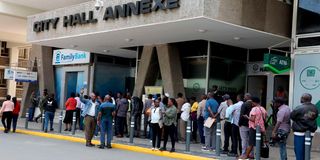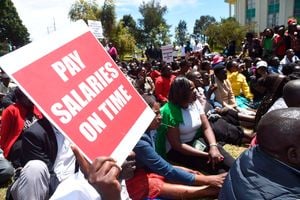
More than 1,080 former retirees of the defunct Nairobi City Council are owed a total of Sh305 million in terminal benefits, with revelations that funds approved by the Budget Controller for the former employees are usually diverted.
The revelations were made during the Labour and Social Welfare Committee chaired by Dandora 1 Ward MP Allan Main Gathuku on Tuesday.
During the hearing, Public Service Chief Officer Janet Omollo Opiata said the county government was struggling to clear terminal dues of the former retirees.
As of October 2024, out of the Sh305 million owed, the county managed to clear only Sh62 million to a section of the employees.
Most of the funds meant for the payment of the retirees are usually diverted after being approved for payment by the Controller of Budget.
“We usually process all the payments for the terminal dues and it is usually approved for payment by the Controller of Budget. But the main problem is that once it reaches the operational account, it is usually diverted to pay other suppliers,” Ms Omollo told the committee.
“That means that we once again have to begin the process afresh and it is time consuming and most of the retirees have never received their dues.”
Mr Gathuku who chaired the committee said the county needs to prioritise the welfare of its former employees.
“These are old people who worked tirelessly to secure their future. We have some situations where some have died and they have never received their dues,” Ms Gathuku said.
“Some are suffering in retirement yet they worked for the county government. We need to prioritise the needs of these former employees and fix the mess.”
In Kisumu County, a total of Sh16 million approved by the county assembly and allocated in the 2022/2023 financial year to pay 14 retirees of the defunct municipal council of Kisumu in 2007 has also never been paid.
In a ruling on Monday, Employment and Labour Relations court judge Jacob Gakeri said the Kisumu CEC for finance and economic planning should ensure the money, which was allocated in the 2022/2023 financial year and approved in the county appropriation Bill 2023, is paid to the retirees.
The 14 retirees led by Jeremiah Achola obtained a judgment of Sh18.5 million against the defunct municipal council of Kisumu in 2007, to be paid their terminal dues.
The judge noted that the Kisumu County Assembly approved the payment of Sh16 million to the 14 retires but they were never paid.
“An Order of mandamus do and is hereby issued to compel the CEC Finance & Economic Planning and CFO Finance Kisumu County to pay the Applicants the sum of Kshs.16 million provided for by the County Assembly of Kisumu in its Budgetary Allocation in the Financial Year 2022/2023 and approved in the Kisumu County Appropriation Bill, 2023, for payment of the retirees of the defunct Local Authority,” ruled the judge.
The judge noted that in a report dated June, 2022 the Sectoral Committee on Labour and Social Welfare found that the 14 were indeed retirees of the Municipal Council of Kisumu, who retired in 2007 without terminal dues.
The retirees submitted their claims for payment through the Kisumu County Assets and Liabilities Committee established under the Inter Government Relations Act and their claims recorded.
Kisumu county government later confirmed that it had provided Sh16 million to be paid to the retirees, after a report was tabled before the county assembly and adopted and communication to be made to the county secretary.
“In the premises it is the finding of the Court the Respondents breached the Applicant’s (retirees) legitimate expectation of payment,” said the judge.
The process of diverting payments begins once a requisition by the county is made to the Controller of Budget (CoB) for the withdrawal of funds from the County Revenue Fund (CRF) to pay authentic suppliers of goods and services.
Once approved, the funds are sent to the operational account made up of development and recurrent accounts, all linked to CRF.
The payment is made on the Integrated Financial Management System (Ifmis) by the chief finance officer of the county, who is the primary approver.
They are in charge of selecting the suppliers to be paid.
The county officials then embark on a dubious payment plan by “voiding” transactions in favour of a predetermined list of suppliers, different from the ones used to make the requisition to the CoB.
jmoturi@ke.nationmedia.com









